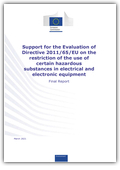Chemycal has been acquired by 3E
Learn MoreChemycal has been acquired by 3E
Learn MoreDiscover how Chemycal PRO helps you boosting your regulatory monitoring:

This study supports the evaluation of Directive 2011/65/EU on the restriction of the use of certain hazardous substances in electrical and electronic equipment (EEE). By restricting their use, the Directive aims at preventing the release of hazardous substances during the use and waste treatment of EEE. Building on desk research and an extensive consultation strategy, the study provides an assessment of the Directive’s effectiveness, efficiency, relevance, coherence, and its EU added value. To estimate the impacts of the Directive, two quantitative scenarios have been developed. The study finds that the Directive reached the objective to reduce hazardous substances in EEE in the EU. This has contributed to the protection of human and environmental health. By setting clear standards and providing a level playing field for manufacturers, the Directive has also contributed to the harmonisation and functioning of the internal market. While the exemption process is deemed relevant and important to maintain, industry representatives highlighted delays in assessing and approving exemptions. The renewed commitment of the EU to the transition to a circular economy and a specific focus on electronic equipment as a “key product value chain” may lead to a reassessment of some of the central mechanisms of RoH.
CONTINUE READING ON: op.europa.eu
2013 © MyChemicalMonitoring. ALL Rights Reserved. About Us | Terms and Conditions